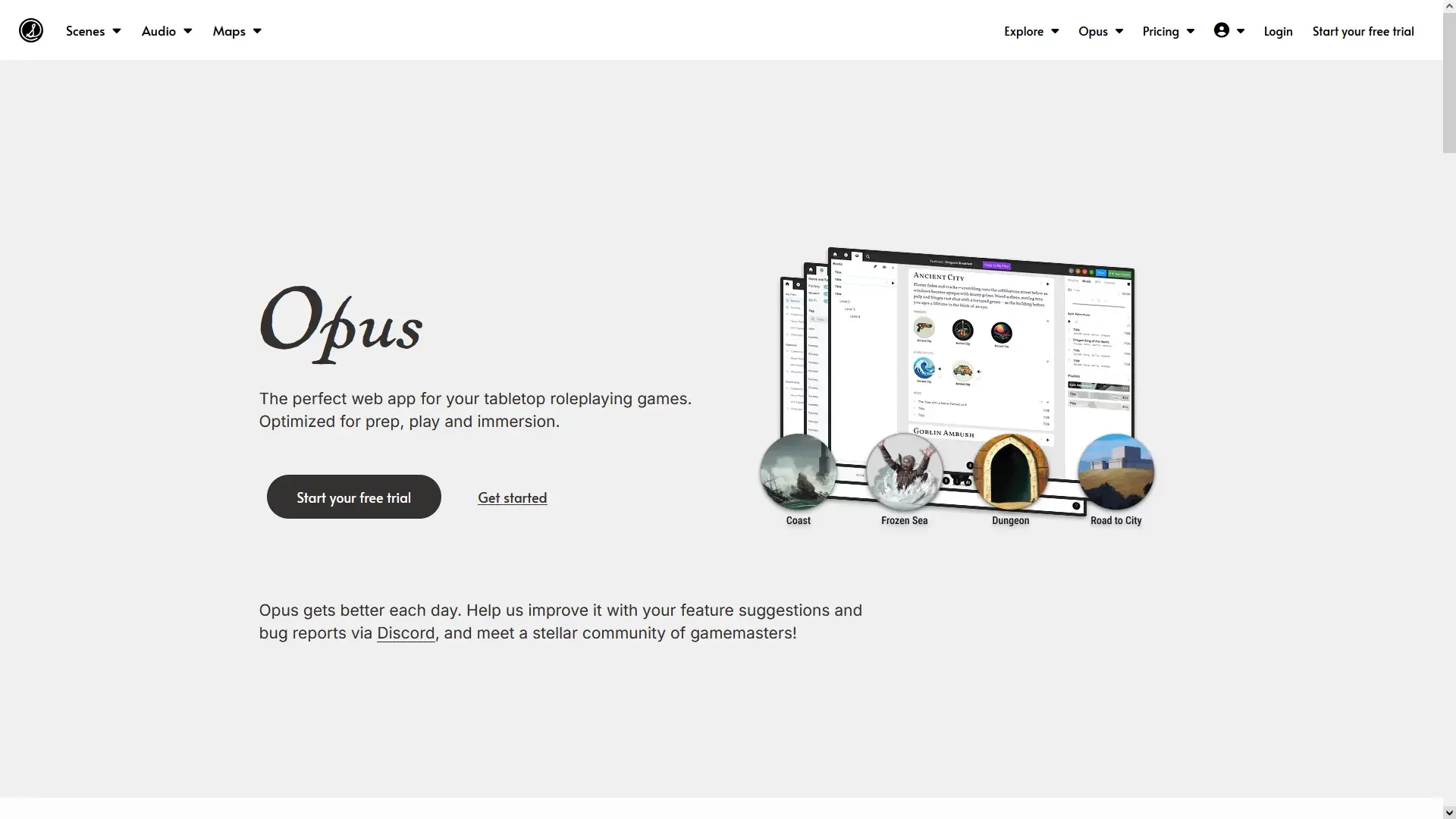
In the world of tabletop role-playing games (TTRPG), digital platforms become increasingly necessary as our day-to-day lives get busier and our love for gaming gets stronger. Enter Syrinscape vs Opus, two major tools that help gamemasters (GM) easily run audio in their game sessions.
Syrinscape dominated the audio landscape in the TTRPG community for many years, earning a wide reputation. In this regard, many platforms have come up with competitive solutions that aim to make your life as a GM simpler than ever before. Thus, Opus by dScryb represents a strong contender for the throne of immersive audio.
In this article, we'll explore the pros and cons of each app in order for you to choose the best one suited for your wants and needs. Most importantly, we'll review recent updates for you to get right into the loop. Let's get started!
Audio Quantity, Quality, and Variety
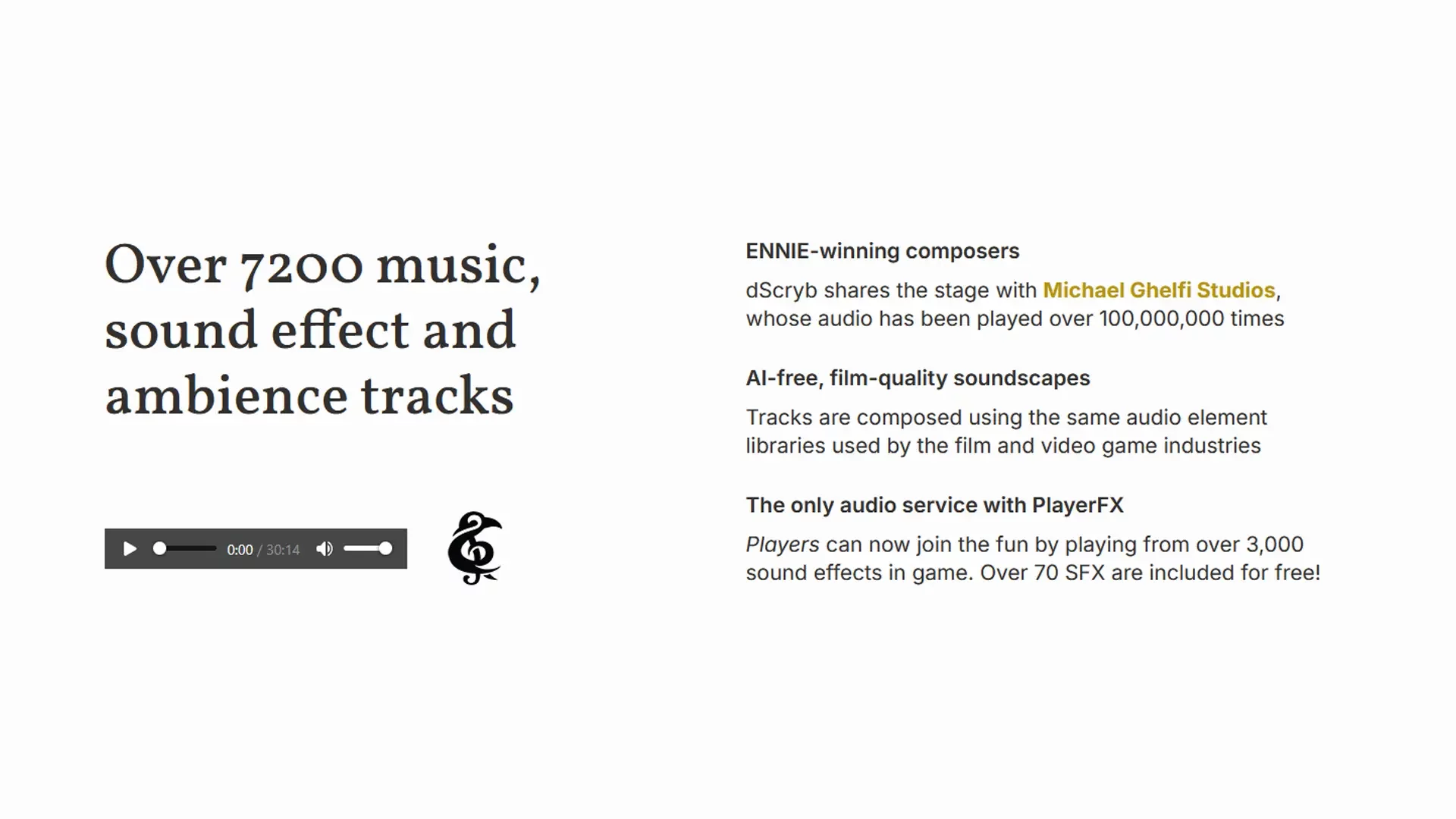
Starting off, Syrinscape offers 1,300+ soundsets that essentially function as curated playlists; each soundset mixes basic assets to create bigger variety at the cost of slight repetition. On the other hand, Opus uses 7,000+ audio assets, which allows for greater audio diversity amongst ambient/music tracks and sound effects (e.g. a triggered trap). Notably, Opus adds 300 new sounds every month.
Regarding technicalities, both Syrinscape and Opus adopt a high-quality audio format known as Ogg. In this sense, you can expect crisp audio definition on both apps. On an extra note, Opus is known to use an audio bitrate of 320kbps, much greater than low-ranges (e.g. 64 kbps) and mid-ranges (e.g. 128kbps) and also the same setting used by Spotify. Syrinscape doesn't disclose audio bitrate.
When it comes to genres, both Syrinscape and Opus cover many common grounds. However, Syrinscape dominates content related to science-fiction—such as Starfinder—while Opus comes ahead with a greater presence in fantasy—such as Dungeons & Dragons and Pathfinder. Additionally, Opus is partnered with Michael Ghelfi Studios, an officially-licensed label for Paizo.
An interesting element is the use of constructed languages (conlangs). Conlangs are fictional tongues often used in media, such as Dothraki from Game of Thrones and Klingon from Star Trek. Opus features many tracks with conlangs, including Elven speech.
User Interface and Experience
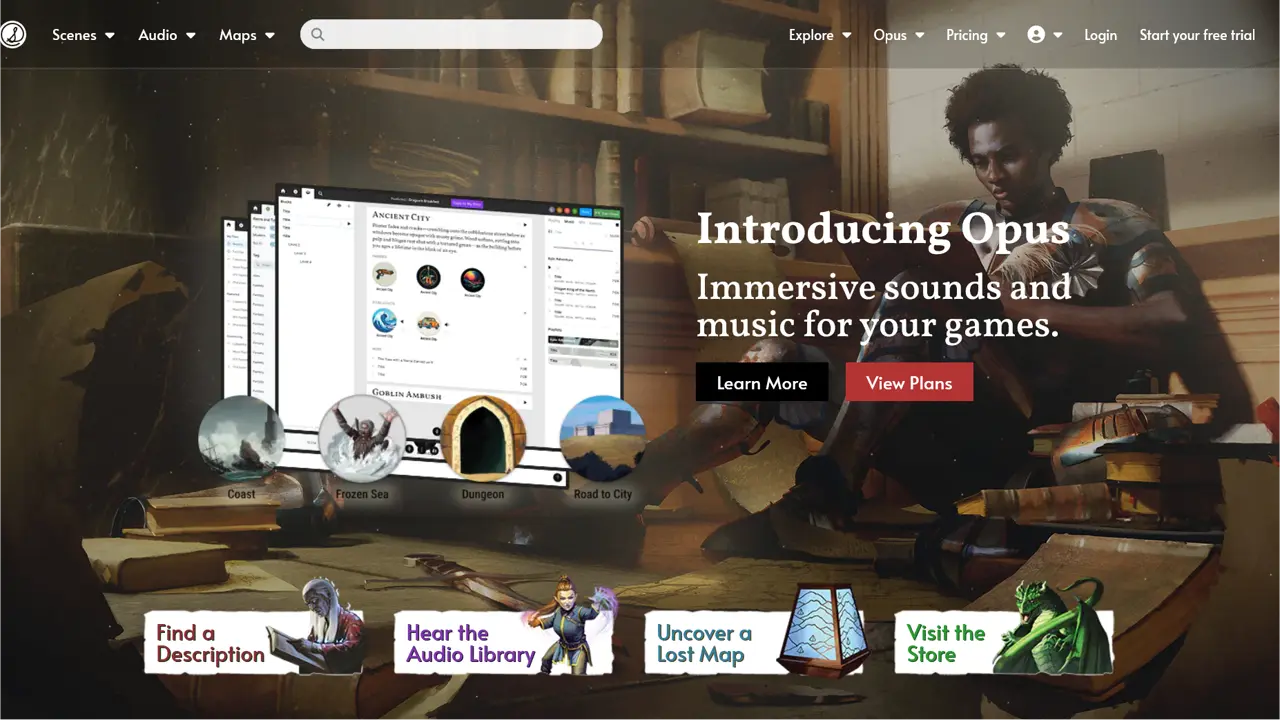
Due to its older influence, Syrinscape still adopts a set of legacy desktop frameworks that are known to impact both the user inteface (UI) and the user experience (UX). Online, users comment on degrading performance and slow loading times.
On the other hand, the recently released Opus operates on modern frameworks, including Angular and Node.js. This foundation is known to be both quick in performance for the UX and sleek in design for the UI. In practical terms, this results in quick-and-easy searches and faster loading times.
Virtual Tabletops: FoundryVTT
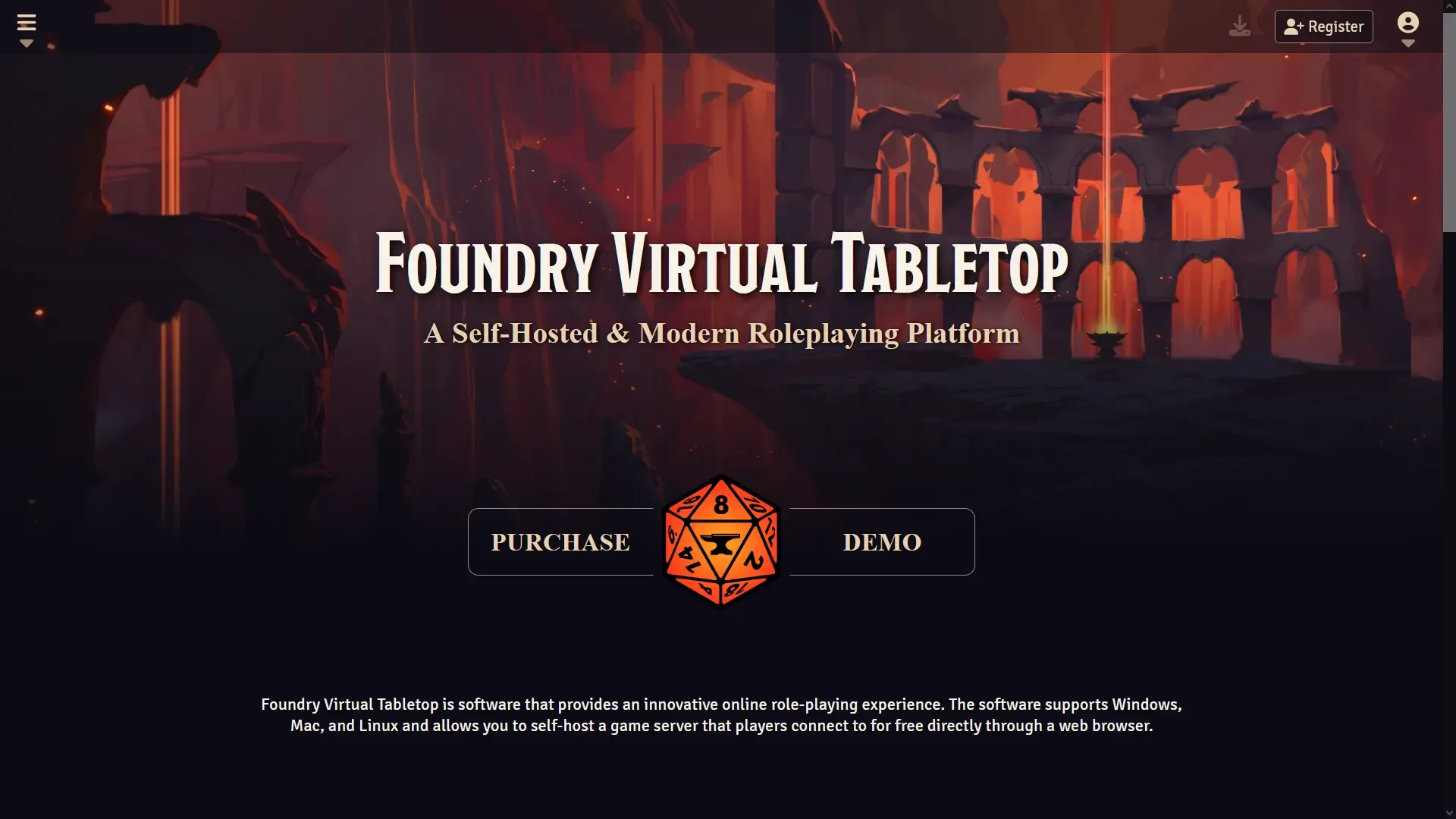
If you use a virtual tabletop (VTT) whenever you're gaming online with friends, having music is a huge immersion bonus. One of the most popular choices is FoundryVTT. Both Syrinscape and Opus have FoundryVTT integration, players can join a session through a link and run it in their own browser. No installation required on either tool, which is definitely a plus.
Syrinscape, mostly due to its older setup, is known to have a more complex and sometimes unresponsive configuration. Users online appreciate the availability of the integration, but notice its lack of proper development.
Opus includes more modern features, such as drag and drop, automatic audio, and spatial audio. Interestingly, Opus also allows the players—and not just the GM—to control the audio's volume and trigger sound effects in-game. A potential downside is that Opus is a newer tool and may take some time to thoroughly adapt to a public more accustomed to traditional tools.
Syrinscape vs Opus: Pricing

Both Syrinscape and Opus are subscription-based services, which can potentially be a budget concern depending on the amount that you're able to invest in your hobby. However, a positive element is that both of these tools' pricings are relatively accessible—with a few caveats.
Syrinscape is $10.99/month with a minimum two-month requirement. Alternatively, users can pay per soundset as they offer more than 500 soundsets at around $15 each. Notably, the price isn't a major concern, but the minimum requirement can be inconvenient for some users.
Opus is $8.29/month with no minimum subscription requirement. The most important benefit is that users get access to Opus' entire content, there isn't a need to "pay per soundset." Furthermore, Opus offers a two-week free trial for those interested in trying it out before investing.
Stability, Growth, and Support
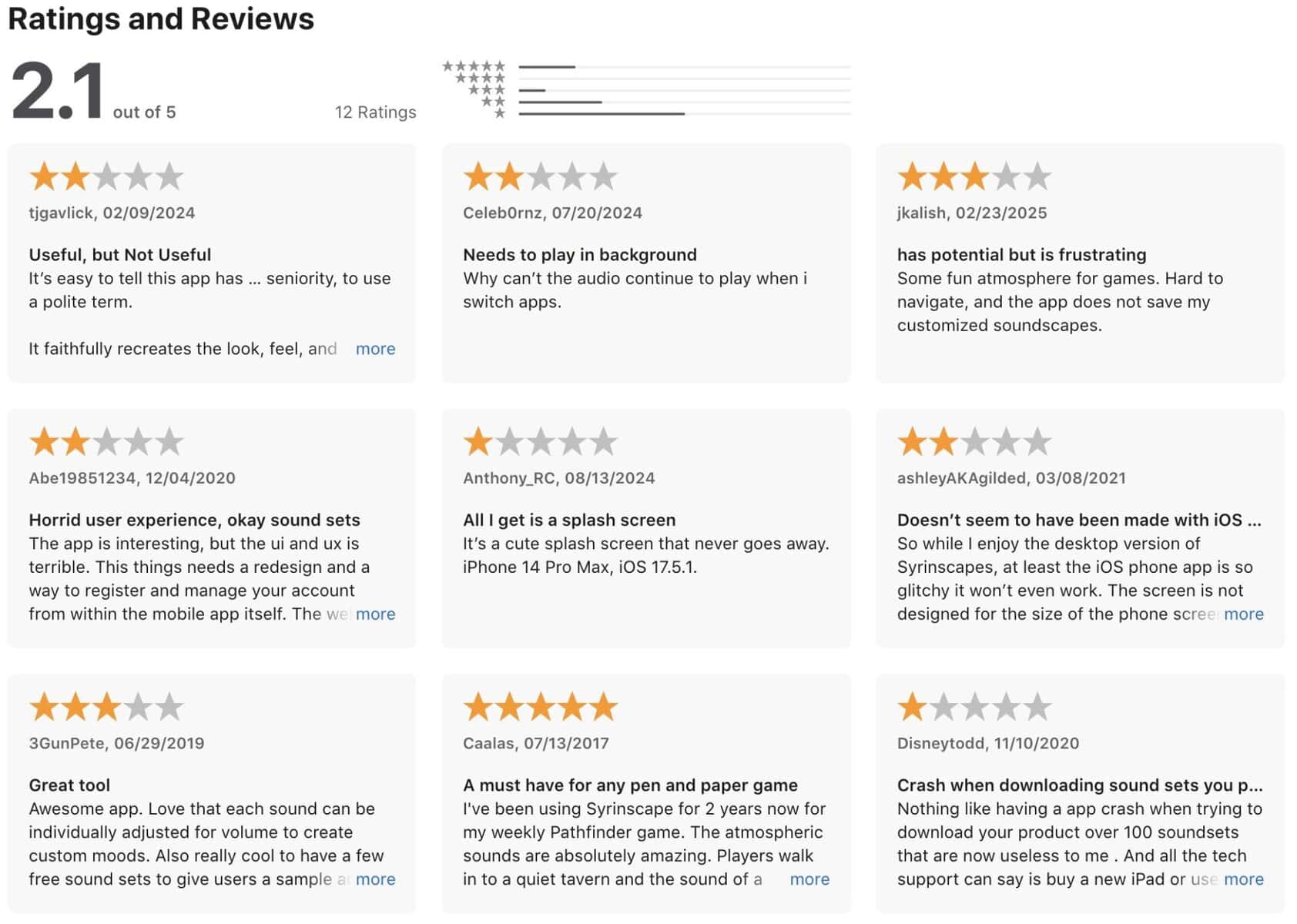
Syrinscape has a stable desktop application. However, their mobile presence is relatively low-rated on Google Play and the App Store. Notably, reviewers highlight the downsides on UI and UX, and there is also a noticeable lack of customer support.
Opus is under active development and users can get support through their Discord or via email. Additionally, Opus is a cross-platform app, as users can access it through a computer, a phone, or a tablet.
Syrinscape vs Opus Unique Features

Both Syrinscape and Opus allows users to use their audio on YouTube and Twitch. However, in order to use Syrinscape's content, users must credit each sound used through their "online credit generator." Conversely, users may add a single line in their video's description to credit Opus.
Syrinscape is exclusively an audio platform. In contrast, Opus expands beyond it by offering features such as note-taking and crosslinking between illustrations, maps, texts, and more. In other words, users can run an entire campaign from the Opus interface.
Interestingly, Opus allows users to submit their own sounds and earn revenue per listen, which can be particularly beneficial for GMs and players that are also composers.
Where Each Platform Shines (And Falls)

Syrinscape is a long-standing titan in the tabletop audio landscape.
It is undoubtedly the most well-known brand in this niche, boasting licensing deals with major RPG campaigns—which is definitely a plus for the players of official adventure modules. Furthermore, the tool is also ahead when it comes to sci-fi content, an added bonus for fans of this genre. However, Syrinscape falls short when it comes to a degrading performance, outdated interface, higher pricing, and smaller content size.
Opus is the newest challenger to the throne of TTRPG audio.
Currently, it lacks recognition when compared to legacy tools and it may take some time before it fully adapts to the traditional userbase. Nonetheless, where it may fall short on its relative recency, Opus can be highlighted for its fast performance, sleek and intuitive design, affordable subscription, and full-access to their content. Last, but not least, users can run an entire campaign from Opus, instead of just audio.
Syrinscape vs Opus: The Verdict

In conclusion, you may choose Syrinscape for higher availability of sci-fi content paired with licensing deals for major campaigns; and you may choose Opus for its quick-and-easy interface, affordable prices, player interaction and if you wish to run an entire campaign instead of just audio.
Ultimately, modern GMs will likely find Opus to be the best investment.


![A close up photograph of a gold-lined medieval helm. Illustrates [alt text].](https://www.michaelghelfistudios.com/wp-content/uploads/2025/01/HEADERKnightEyeslit.unsplash.carlos-felipe-ramirez-mesa-X9nrbX_Scn4.webp)
